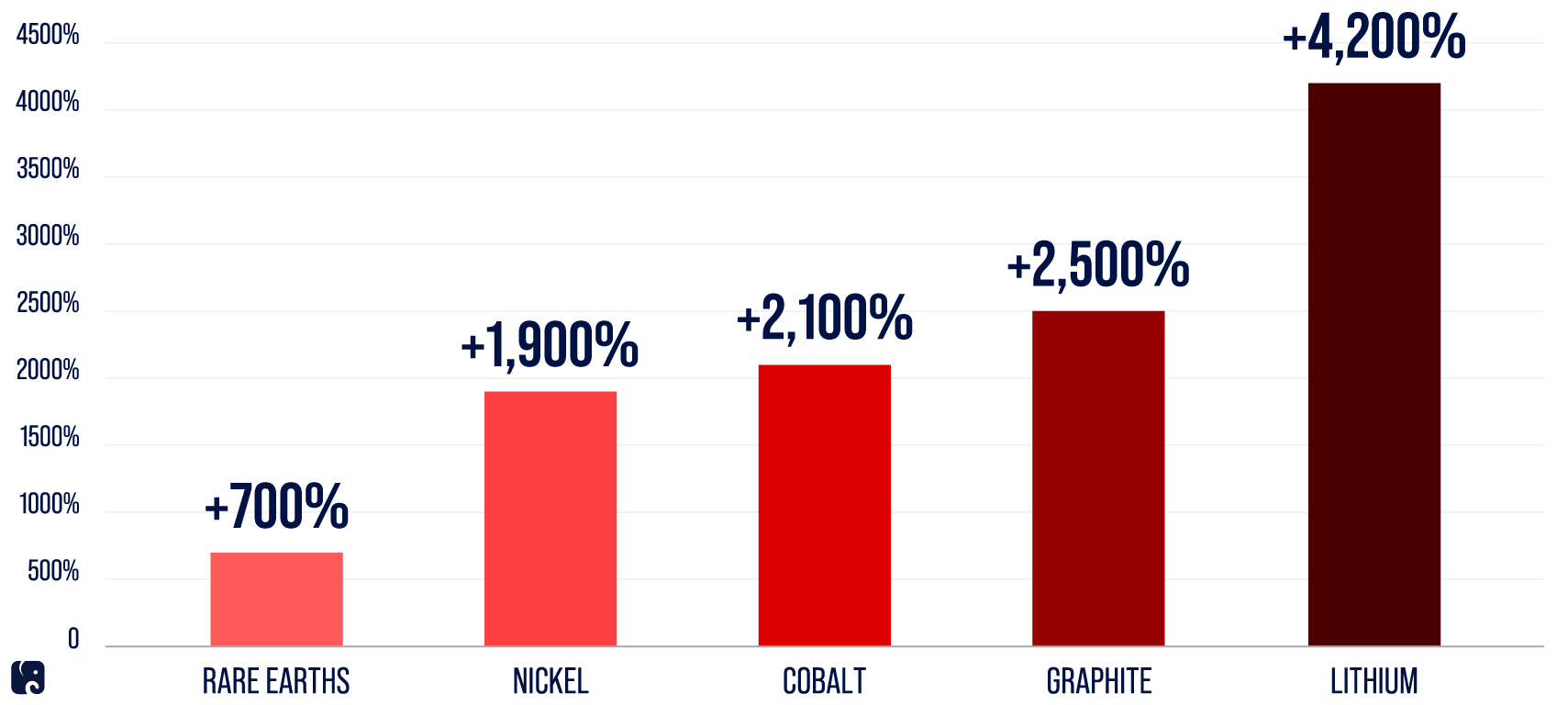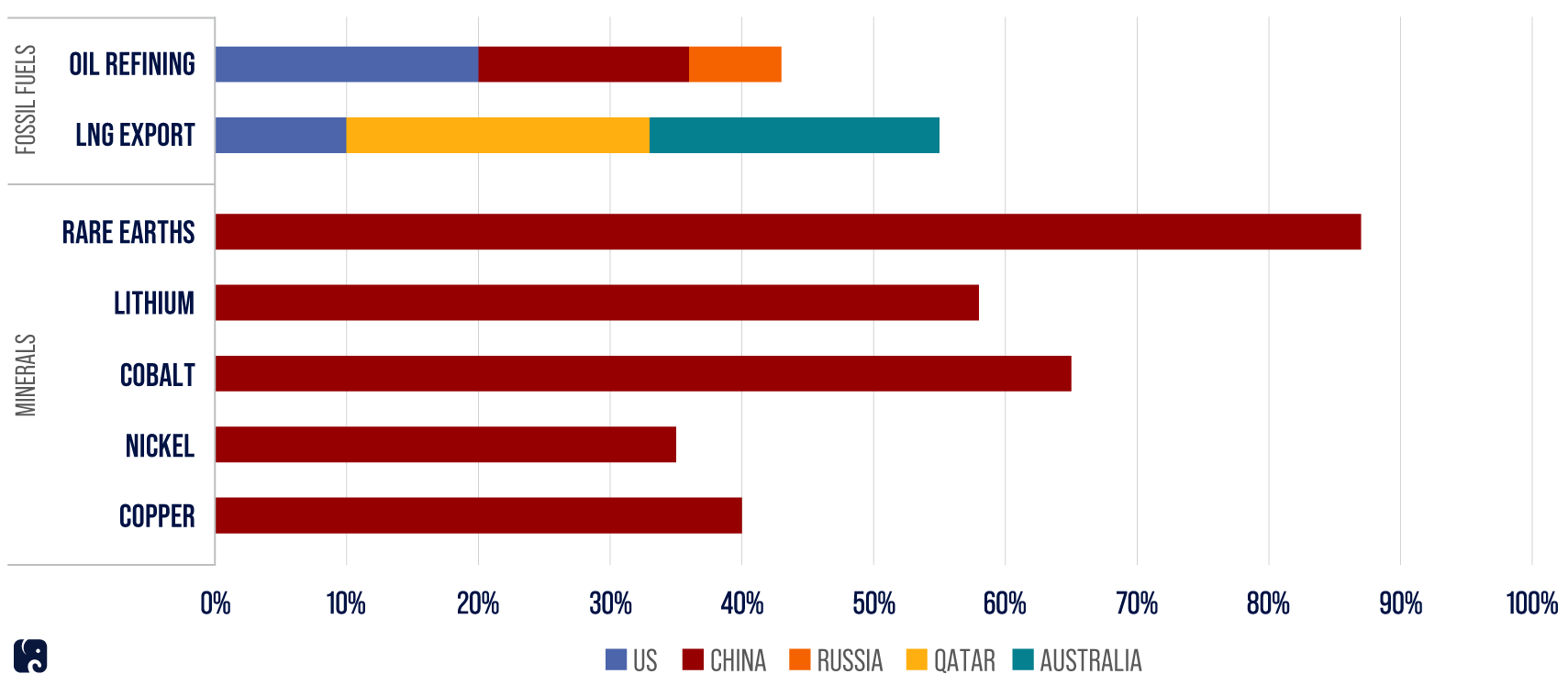Democrats' Green Agenda Risks National Security
KEY TAKEAWAYS
- Democrats point to Russia’s invasion of Ukraine as a reason to charge forward with their radical Green New Deal agenda, meaning a massive shift to electric vehicles and renewable energy.
- A 2021 report by the International Energy Agency found that over the next two decades global green energy commitments could increase demand for rare earth elements by as much as 700%, nickel by 1,900%, cobalt by 2,100%, and lithium by 4,200%.
- The left’s plan to rapidly transition to green technologies will leave the U.S. more dependent on China, which currently mines and processes much of the material needed for these technologies.
Democrats have spent the past year pursuing their radical Green New Deal energy agenda. Now the left is using Russia’s war in Ukraine to try to justify a massive transition to electric vehicles and renewable energy. If enacted, this would significantly increase our dependence on China for certain “critical minerals” and other materials needed for these energy sources. If the left successfully implements its flawed agenda without strengthening supply chains, the United States could become significantly dependent on China for its energy needs. China could use its commanding influence over green energy technology to get its way in the future, just as Russia used its energy to influence Europe not to act prior to the invasion of Ukraine.
growing demand for Critical Minerals
Critical minerals are specific substances identified as being vital to a range of industries including energy, electronics, and the military. Electric vehicles and renewable energy sources, such as solar and wind, require significant amounts of critical minerals. One analysis by several professors from the United Kingdom found that to swap the UK’s 32 million cars with EVs would demand about double the world’s annual output of cobalt, almost all the neodymium, and 75% of the lithium. Comparatively, about eight times as much would be required to convert the entire U.S. fleet of 260 million cars.
A 2021 report by the International Energy Agency found that by 2040, anticipated global green energy commitments could increase demand for “rare earth elements,” a subset of critical minerals, by as much as 700%. Demand for nickel could grow by 1,900%, cobalt by 2,100%, and lithium by a staggering 4,200%. These minerals are needed for the development of wind turbines and solar panels, as well as for electric vehicles.
Demand for Critical Minerals Expected to Soar in 2040

Source: IEA
These substances also play a key part in our national defense. Construction of each F-35 combat aircraft requires more than 900 pounds of critical minerals. Copper, lead, cobalt, uranium, and a significant amount of other minerals are needed for munitions, armor, and communications gear. Ships, vehicles, and aircraft will continue to require these materials to keep up with advanced technological needs. The problem is acute; the DoD is facing a critical shortage of munitions and the defense industry is having trouble meeting the demand for more advanced weapons. The U.S. military’s stockpile of critical minerals is already shrinking and increased demand will continue to stress those reserves.
If we add to the demand for these minerals to make more electric vehicles and solar panels, while not increasing domestic production, we would only make it tougher to meet the need for military applications. In a recent Energy and Natural Resources Committee hearing, one defense industry executive discussed how competition from other products has affected his ability to get parts needed to make advanced weapon systems.
dependence on foreign mineral supplies
The problem is not just that Democrats’ plans will increase the demand for these elements. It is also a question of where the materials come from. The pandemic made us all aware of how dependent we are on the global supply chain and what happens in one link of that chain breaks. The supply of critical minerals is no different. The batteries for a typical electric car require 19.6 pounds of lithium, and 58% of the world’s lithium is processed in China. Batteries also require high-quality nickel; almost 20% of global supply is produced by Russia.
Russia’s actions in Ukraine demonstrate what can happen when one country controls a large share of the global energy market. European countries have grown dependent on the Russians for much of their oil, natural gas, coal, and other energy supplies. Now they are scrambling to find alternative sources of fuel to heat their homes and fuel their economies. For many of these countries, their dependence was fueled by radical climate policies such as phasing out nuclear power and limiting fracking.
Democrats, through their anti-fossil-fuel agenda, have been trying to eliminate America’s ability to produce domestic oil and gas that could help us respond to this kind of shock to the energy markets. Furthermore, the Biden administration’s sanctions provide loopholes to allow for energy transactions until June 24. Democrats have a way to relieve the pressure Russia places on energy markets, mainly by increasing domestic production, but so far they have seemed more interested in pursuing a progressive campaign against energy.
Countries Leading Processing

Source: IEA
Instead of learning a lesson about the danger of depending on other, often antagonistic, countries for critical materials, the Biden administration and Democrats in Congress are pushing an agenda to make things worse. Democrats are actually trying to use Russia’s war in Ukraine to justify their climate goals, while disregarding the fact that we do not have enough of the raw materials necessary to support their pipe dreams and will therefore be forced to rely more on China.
Just as the Russians have used energy to influence Europe, the Chinese have already used their command over the critical minerals market to advance their political agenda. In 2010, the Chinese government temporarily stopped all exports of critical minerals to Japan over a diplomatic dispute around a collision at sea, foreshadowing what is to come if the world depends on China for the majority of its energy-related mineral needs.
Democrats’ Counterproductive Strategy
In March, while discussing the high gasoline prices crushing families, President Biden announced he would invoke the Defense Production Act to facilitate the production of critical minerals for renewable energy and electric vehicles, but not for defense purposes. The administration has acknowledged that the National Defense Stockpile requires about $1 billion in investment. By not using the DPA to help meet this need, focusing only on clean energy, it missed an opportunity to revitalize the domestic industrial base for critical materials.
However, the number one barrier to increased American mineral production is the burdensome federal permitting process. Last year, as part of their reckless tax and spending spree, Democrats sought to block a mining project in Arizona that could reportedly supply one-quarter of the copper needed by the United States. President Biden’s Department of the Interior canceled two mineral leases for nickel and copper projects in Minnesota in January, and in February it took action to block a road project that would serve a copper mine in Alaska.
Democrats are embracing mineral recycling to help meet the demands of their green agenda, but this approach alone won’t address the deficiency. IEA noted in its 2021 report that recycled batteries could cover approximately 10% of the expected demand for copper, lithium, nickel, and cobalt.
Republicans have been sounding the alarm on the growing crisis in critical minerals and have called for increasing domestic mineral production. To address the lengthy permitting process for mineral production projects, Republicans have introduced legislation to make federal reviews more efficient. The mining industry says it takes seven to 10 years on average to get the government permits to start mining operations in the U.S., compared to about two years in Canada and Australia.
Republicans also have decried action by the Biden administration that will perpetuate dependence on foreign sources for important minerals. In February, the Biden administration released its updated list of 50 identified critical minerals. It specifically deleted uranium, which fuels emission-free nuclear power. While there is some domestic supply, the United States is heavily dependent on foreign countries for uranium. In 2020, Russian uranium accounted for 16% of imports into the U.S. Republicans have introduced legislation to stem these imports and help curb the funds Vladimir Putin has for his war in Ukraine.
The demand for critical minerals is large and growing. Democrats’ radical energy agenda would make things worse. This poses risks not just for our economic stability, but also for our national security.
Next Article Previous Article
